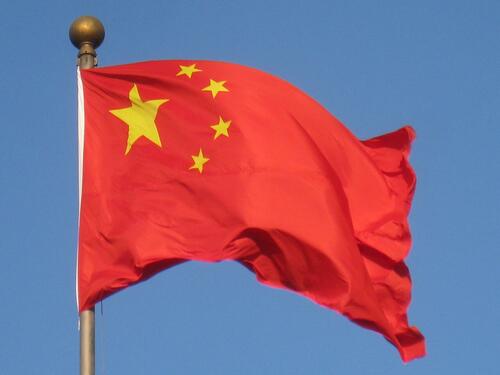
Authored by Audrey Oien via RealClearDefense,
If China were to invade Taiwan, it is likely that Russia would provide Beijing with military, economic, or political assistance. While some experts have argued Ukraine and Taiwan are not the same situation, there are nonetheless lessons that can be drawn from Russia’s war in Ukraine, as well as insight from U.S. officials that can be drawn upon to come to this conclusion.
Over the last several years, Russia and China have grown closer in many ways, including through increased military cooperation. Of the numerous joint exercises that have been held, ones that stand out are joint naval drills and air force patrols over the East China Sea. The naval drills began in 2022 and are the closest that joint drills have been held to the Taiwan Strait. Joint exercises are not a smoking gun, but concern from American officials may be a reliable indicator that this is worth paying attention to.
In early May, two American intelligence officials testified before the Senate Armed Services Committee that increased Sino-Russian military cooperation has prompted new planning in the Department of Defense. Director of National Intelligence Avril Haines stated that China and Russia are exercising together in relation to Taiwan for the first time, and that “China definitely wants Russia to be working with them.” She then said, “we see no reason why they wouldn’t” work together. Answering a follow-up question from Senator Mike Rounds, Haines confirmed that in the event of a conflict with Russia or China, a second front opening with the other is possible, with the likelihood depending on the scenario. U.S. Air Force Lieutenant General Jeffrey Kruse testified that Russian and Chinese military forces “would certainly be cooperative,” if not interoperable.
But on what grounds would Russia assist China Why would it be willing to aid Beijing in an invasion that would likely be met with a response from the United States and its allies? The most simple answer is because China did it for Russia. Russian President Vladimir Putin is now indebted to Chinese President Xi Jinping, whether he realizes it or not. And no, the debt is not payable by monetary means. Putin will be able to pay his debts to Xi for his assistance in a war that has turned Chinese public opinion toward Ukraine, led to sanctions, and affected Xi’s image by providing assistance if, or when, China invades Taiwan.
To get a better idea of what this assistance could look like, one can take a look at how China has aided Russia’s war in Ukraine. According to U.S. officials, China has helped supply Russia with dual-use material like optics, microelectronics, and drone engines to boost Moscow’s arms production, as well as provided Moscow with cruise missiles and machine tools for ballistic missiles. U.S. intelligence claims that Russian and Chinese groups have worked together to jointly produce drones inside Russia. It was also reported that a Chinese government agency established to promote trade with Russia has been attempting to source drone detectors and jammers, likely to supply Moscow with. U.S. officials further claimed that China helped Russia improve satellite and other space-based capabilities, as well as provided satellite imagery. Additionally, it was reported that China supplied Russia with 90% of the chips it imported in 2023 which were used to make missiles, tanks, and aircraft. The British Defense Minister has also accused China of providing or preparing to provide Russia with lethal aid.
Beyond providing this military equipment, China has continued support for Russia in its wartime by working together to avoid taxes and evade Western sanctions on goods like copper. And, China has increased imports of Russian gas and oil since the war began, as imports from the US, UK, and EU have dropped due to sanctions. Politically, Ukrainian leader Volodymyr Zelenskyy accused China of using its influence and diplomats to help Russia disrupt the 15-16 June peace summit on Ukraine in Switzerland by encouraging other countries not to attend.
Russian support during a Chinese invasion of Taiwan could follow in a similar vein. Or, Xi may be able to pressure Putin into providing something more than what Beijing has done for Moscow. Analysts have maintained that Beijing holds the upper hand in the Sino-Russian partnership. While the relationship has been described as having no limits, it is not a relationship between two equals. Russia’s economic dependence on China puts Putin in a vulnerable position, with little room to say “no.”
The capacity in which Russia may offer China assistance during an invasion of Taiwan can be debated. Several factors would come into play, including the length of the conflict and those involved, specifically the degree to which the US would respond. Would the invasion take less than an hour, as one expert claims? Or would the conflict become drawn out and turn into a hot war with the US? Regardless of the exact scenario that could play out, Russia would most likely aid China in some capacity. Whether its military support during the invasion, economic assistance and support following an invasion, or political and diplomatic support, China’s role in the Sino-Russian partnership and demonstrated support for Russia during the war in Ukraine places it in a position to solicit some form of assistance from Moscow during an invasion of Taiwan. While this reasoning could stand on its own, it is supported by U.S. officials’ testimony that the U.S. Department of Defense is reconsidering its planning and preparedness to account for cooperation between Russia and China during a conflict.
Audrey Oien is a Research Analyst at RANE, primarily focusing on the Asia-Pacific.
Authored by Audrey Oien via RealClearDefense,
If China were to invade Taiwan, it is likely that Russia would provide Beijing with military, economic, or political assistance. While some experts have argued Ukraine and Taiwan are not the same situation, there are nonetheless lessons that can be drawn from Russia’s war in Ukraine, as well as insight from U.S. officials that can be drawn upon to come to this conclusion.
Over the last several years, Russia and China have grown closer in many ways, including through increased military cooperation. Of the numerous joint exercises that have been held, ones that stand out are joint naval drills and air force patrols over the East China Sea. The naval drills began in 2022 and are the closest that joint drills have been held to the Taiwan Strait. Joint exercises are not a smoking gun, but concern from American officials may be a reliable indicator that this is worth paying attention to.
In early May, two American intelligence officials testified before the Senate Armed Services Committee that increased Sino-Russian military cooperation has prompted new planning in the Department of Defense. Director of National Intelligence Avril Haines stated that China and Russia are exercising together in relation to Taiwan for the first time, and that “China definitely wants Russia to be working with them.” She then said, “we see no reason why they wouldn’t” work together. Answering a follow-up question from Senator Mike Rounds, Haines confirmed that in the event of a conflict with Russia or China, a second front opening with the other is possible, with the likelihood depending on the scenario. U.S. Air Force Lieutenant General Jeffrey Kruse testified that Russian and Chinese military forces “would certainly be cooperative,” if not interoperable.
But on what grounds would Russia assist China? Why would it be willing to aid Beijing in an invasion that would likely be met with a response from the United States and its allies? The most simple answer is because China did it for Russia. Russian President Vladimir Putin is now indebted to Chinese President Xi Jinping, whether he realizes it or not. And no, the debt is not payable by monetary means. Putin will be able to pay his debts to Xi for his assistance in a war that has turned Chinese public opinion toward Ukraine, led to sanctions, and affected Xi’s image by providing assistance if, or when, China invades Taiwan.
To get a better idea of what this assistance could look like, one can take a look at how China has aided Russia’s war in Ukraine. According to U.S. officials, China has helped supply Russia with dual-use material like optics, microelectronics, and drone engines to boost Moscow’s arms production, as well as provided Moscow with cruise missiles and machine tools for ballistic missiles. U.S. intelligence claims that Russian and Chinese groups have worked together to jointly produce drones inside Russia. It was also reported that a Chinese government agency established to promote trade with Russia has been attempting to source drone detectors and jammers, likely to supply Moscow with. U.S. officials further claimed that China helped Russia improve satellite and other space-based capabilities, as well as provided satellite imagery. Additionally, it was reported that China supplied Russia with 90% of the chips it imported in 2023 which were used to make missiles, tanks, and aircraft. The British Defense Minister has also accused China of providing or preparing to provide Russia with lethal aid.
Beyond providing this military equipment, China has continued support for Russia in its wartime by working together to avoid taxes and evade Western sanctions on goods like copper. And, China has increased imports of Russian gas and oil since the war began, as imports from the US, UK, and EU have dropped due to sanctions. Politically, Ukrainian leader Volodymyr Zelenskyy accused China of using its influence and diplomats to help Russia disrupt the 15-16 June peace summit on Ukraine in Switzerland by encouraging other countries not to attend.
Russian support during a Chinese invasion of Taiwan could follow in a similar vein. Or, Xi may be able to pressure Putin into providing something more than what Beijing has done for Moscow. Analysts have maintained that Beijing holds the upper hand in the Sino-Russian partnership. While the relationship has been described as having no limits, it is not a relationship between two equals. Russia’s economic dependence on China puts Putin in a vulnerable position, with little room to say “no.”
The capacity in which Russia may offer China assistance during an invasion of Taiwan can be debated. Several factors would come into play, including the length of the conflict and those involved, specifically the degree to which the US would respond. Would the invasion take less than an hour, as one expert claims? Or would the conflict become drawn out and turn into a hot war with the US? Regardless of the exact scenario that could play out, Russia would most likely aid China in some capacity. Whether its military support during the invasion, economic assistance and support following an invasion, or political and diplomatic support, China’s role in the Sino-Russian partnership and demonstrated support for Russia during the war in Ukraine places it in a position to solicit some form of assistance from Moscow during an invasion of Taiwan. While this reasoning could stand on its own, it is supported by U.S. officials’ testimony that the U.S. Department of Defense is reconsidering its planning and preparedness to account for cooperation between Russia and China during a conflict.
Audrey Oien is a Research Analyst at RANE, primarily focusing on the Asia-Pacific.
Loading…







